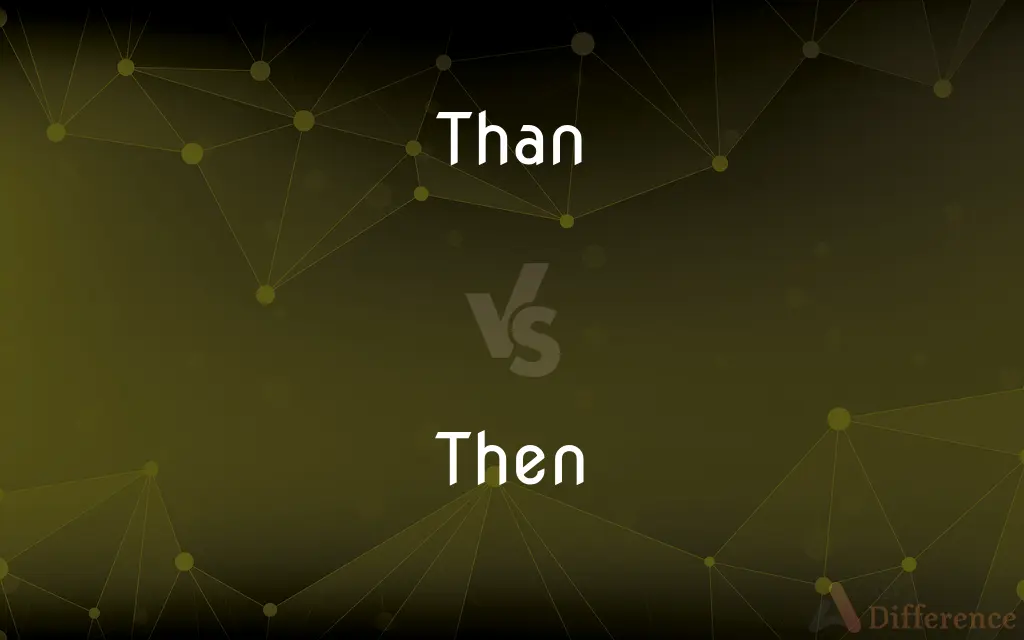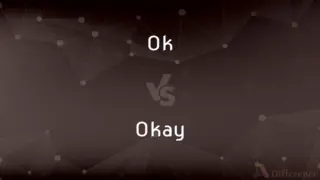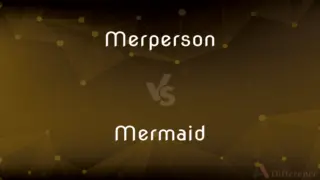Than vs. Then — What's the Difference?
Edited by Tayyaba Rehman — By Fiza Rafique — Updated on September 26, 2023
"Than" is a conjunction used for comparison, while "Then" denotes time or sequence. Both are frequently used but serve distinct purposes in sentences.

Difference Between Than and Then
Table of Contents
ADVERTISEMENT
Key Differences
"Than" and "Then" are two terms in English that, due to their phonetic closeness, are often muddled. "Than" primarily functions as a conjunction to draw comparisons. When you decide to pick one thing over another or indicate a preference, "Than" comes into play. For instance, one might say, "She is taller than her brother," pointing out a difference in height.
"Then," on the flip side, is an adverb that pertains to time or the order in which events occur. If you're narrating a sequence of events or indicating a specific time, "Then" would be your go-to word. A typical sentence would be, "I went to the store, then came home." This sentence recounts a sequence, making "Then" the appropriate choice.
Moreover, "Than" delves into the realm of relationships between two or more entities, be it in terms of quantity, quality, or degree. Its whole essence is about juxtaposition. "Then," conversely, walks us through a timeline, marking progression or regression.
Another noteworthy distinction lies in their grammatical roles. "Than" is rigid in its function as a conjunction. "Then," however, dons multiple hats, primarily serving as an adverb but occasionally stepping into the shoes of a noun, adjective, or even a conjunction. These two words, though similar-sounding, cater to different narrative needs in English.
Comparison Chart
Part of Speech
Conjunction
Adverb (primarily), can also be noun, adjective, or conjunction
ADVERTISEMENT
Primary Function
To draw comparisons
Indicates time or sequence
Example Usage
"She's more diligent than him."
"He finished dinner; then he watched TV."
Temporal Relation
None
Pertains to time or order of events
In Relation To
Deals with juxtaposing entities in terms of quality, quantity, etc.
Often connects events in a chronological or logical sequence
Compare with Definitions
Than
Indicates preference or superiority.
I'd rather read than watch TV.
Then
Suggests an appropriate or obvious action.
If you're going, then take an umbrella.
Than
Used to introduce the second element in a comparison.
He is older than she is.
Then
At that time; at the time in question
He accepted a peerage from the then Prime Minister, Edward Heath
Phoebe by then was exhausted
I was living in Cairo then
Than
Describes exception or difference.
Other than the last chapter, the book was great.
Then
After that; next; afterwards
She won the first and then the second game
Than
A conjunction used in comparisons.
Apples are healthier than candies.
Then
In that case; therefore
If you do what I tell you, then there's nothing to worry about
Well, that's okay then
Than
Used in expressions of excess.
More than you know.
Then
At that time
I was still in school then. Come at noon.
I'll be ready then.
Than
Than is a grammatical particle analyzed as both a conjunction and a preposition in the English language. It introduces a comparison and is associated with comparatives and with words such as more, less, and fewer.
Then
Next in time, space, or order; immediately afterward
Watched the late movie and then went to bed.
Than
Introducing the second element in a comparison
Jack doesn't know any more than I do
He was much smaller than his son
Then
In addition; moreover; besides
It costs $20, and then there's the sales tax to pay.
Than
Used in expressions introducing an exception or contrast
He claims not to own anything other than his home
They observe rather than act
Then
Used after but to qualify or balance a preceding statement
The star was nervous, but then who isn't on the first night of a new play.
Than
Used in expressions indicating one thing happening immediately after another
Scarcely was the work completed than it was abandoned
Then
In that case; accordingly
If traffic is heavy, then allow extra time.
Than
Introducing the second element in a comparison
Jack doesn't know any more than I do
He was much smaller than his son
Then
As a consequence; therefore
The case, then, is closed.
Than
Used in expressions introducing an exception or contrast
They observe rather than act
He claims not to own anything other than his home
Then
Usage Problem And after that
I showered, then combed my hair.
Than
Used in expressions indicating one thing happening immediately after another
Scarcely was the work completed than it was abandoned
Then
That time or moment
The bus leaves at four.
Until then let's walk.
Than
Used after a comparative adjective or adverb to introduce the second element or clause of an unequal comparison
She is a better athlete than I.
Then
Being so at that time
The then chairman of the board.
Than
Used to introduce the second element after certain words indicating difference
He draws quite differently than she does.
Then
(temporal location) At that time.
He was happy then.
Than
When. Used especially after hardly and scarcely
I had scarcely walked in the door than the commotion started.
Then
(temporal location) Soon afterward.
He fixed it, then left.
Turn left, then right, then right again, then keep going until you reach the service station.
Than
In comparison or contrast with
Could run faster than him.
Outclassed everyone other than her.
Then
(sequence) Next in order of place.
There are three green ones, then a blue one.
Than
Used in comparisons, to introduce the basis of comparison.
She's taller than I am;
She found his advice more witty than helpful;
We have less work today than we had yesterday;
We had no choice than to return home
Then
In addition; also; besides.
Than
Because; for.
Then
(conjunctive) In that case.
If it’s locked, then we’ll need the key.
Is it 12 o'clock already? Then it's time for me to leave.
You don't like potatoes? What do you want me to cook, then?
Than
Introduces a comparison, and is associated with comparatives, and with words such as more, less, and fewer. Typically, it seeks to measure the force of an adjective or similar description between two predicates.
Patients diagnosed more recently are probably surviving an average of longer than two years.
No player is more skillful than Greg.
Then
(sequence) At the same time; on the other hand.
That’s a nice shirt, but then, so is the other one.
Than
At that time; then.
Then
Used to contradict an assertion.
Than
A particle expressing comparison, used after certain adjectives and adverbs which express comparison or diversity, as more, better, other, otherwise, and the like. It is usually followed by the object compared in the nominative case. Sometimes, however, the object compared is placed in the objective case, and than is then considered by some grammarians as a preposition. Sometimes the object is expressed in a sentence, usually introduced by that; as, I would rather suffer than that you should want.
Behold, a greater than Solomon is here.
Which when Beelzebub perceived, than whom,Satan except, none higher sat.
It's wiser being good than bad;It's safer being meek than fierce;It's fitter being sane than mad.
Then
Being so at that time.
Than
Then. See Then.
Thanne longen folk to gon on pilgrimages.
Then
That time
It will be finished before then.
Then
Obsolete spelling of than
Then
At that time (referring to a time specified, either past or future).
And the Canaanite was then in the land.
Now I know in part; but then shall I know even as also I am known.
Then
Soon afterward, or immediately; next; afterward.
First be reconciled to thy brother, and then come and offer thy gift.
Then
At another time; later; again.
One while the master is not aware of what is done, and then in other cases it may fall out to be own act.
But that opinion, I trust, by then this following argument hath been well read, will be left for one of the mysteries of an indulgent Antichrist.
Then
Than.
Then
In that case; in consequence; as a consequence; therefore; for this reason.
If all this be so, then man has a natural freedom.
Now, then, be all thy weighty cares away.
Then
That time; that moment;
We will arrive before then
We were friends from then on
Then
At a specific prior time;
The then president
Then
Subsequently or soon afterward (often used as sentence connectors);
Then he left
Go left first, then right
First came lightning, then thunder
We watched the late movie and then went to bed
And so home and to bed
Then
In that case or as a consequence;
If he didn't take it, then who did?
Keep it then if you want to
The case, then, is closed
You've made up your mind then?
Then you'll be rich
Then
At that time;
I was young then
Prices were lower back then
Science as it was then taught
Then
Refers to a specific time in the past or future.
I lived in New York back then.
Then
Indicates what comes next or afterward in a sequence.
We'll go shopping, and then to the movies.
Then
Used to emphasize a result or consequence.
If you're tired, then rest.
Then
Refers to considering a particular fact.
It's late, then why is he outside?
Common Curiosities
What's the primary function of "Then"?
To indicate a point in time or a sequence of events.
Can "Than" and "Then" be used interchangeably?
No, they serve different purposes in sentences.
Is "Then" always about the past?
Not necessarily. It can refer to the past, future, or sequence of events.
Is "Than" an adverb?
No, "Than" is primarily a conjunction.
Can "Then" be used as a conjunction?
Rarely, but it primarily indicates sequence or time.
Is "Than" always about comparing?
Mostly, as it's primarily used to highlight differences or preferences.
Does "Than" always require two entities for comparison?
Generally, yes, as it highlights the relationship between them.
Do "Than" and "Then" sound similar?
Yes, they sound alike but have different meanings and uses.
Does "Than" have any temporal connotations?
No, "Than" doesn't relate to time.
How is "Then" used as a noun?
Rarely, but it can mean "that time," e.g., "Since then, she's been cautious."
Is "Than" always followed by a comparative adjective?
Not always, but often it is used with comparative forms.
How can I remember the difference between the two?
Think "Then" for time and "Than" for comparison.
Can "Then" be used in conditional sentences?
Yes, e.g., "If it rains, then we won't go out."
Can "Then" refer to a consequence?
Yes, e.g., "If you don't study, then you won't pass."
Is "Than" used only in comparisons?
Largely, yes. It juxtaposes entities in terms of quality, quantity, or degree.
Share Your Discovery

Previous Comparison
Ok vs. Okay
Next Comparison
Merperson vs. MermaidAuthor Spotlight
Written by
Fiza RafiqueFiza Rafique is a skilled content writer at AskDifference.com, where she meticulously refines and enhances written pieces. Drawing from her vast editorial expertise, Fiza ensures clarity, accuracy, and precision in every article. Passionate about language, she continually seeks to elevate the quality of content for readers worldwide.
Edited by
Tayyaba RehmanTayyaba Rehman is a distinguished writer, currently serving as a primary contributor to askdifference.com. As a researcher in semantics and etymology, Tayyaba's passion for the complexity of languages and their distinctions has found a perfect home on the platform. Tayyaba delves into the intricacies of language, distinguishing between commonly confused words and phrases, thereby providing clarity for readers worldwide.















































